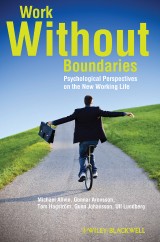Details

Work Without Boundaries
Psychological Perspectives on the New Working Life1. Aufl.
|
40,99 € |
|
| Verlag: | Wiley |
| Format: | EPUB |
| Veröffentl.: | 21.03.2011 |
| ISBN/EAN: | 9781119996231 |
| Sprache: | englisch |
| Anzahl Seiten: | 288 |
DRM-geschütztes eBook, Sie benötigen z.B. Adobe Digital Editions und eine Adobe ID zum Lesen.
Beschreibungen
Drawing on more than a decade of inter-disciplinary research, this book provides a comprehensive overview of the available theories, concepts, data and research on new work organizations and the concept of ‘work without boundaries’. <ul> <li>Explores a concept of work that is not restricted by traditional organizational rules like regular office hours, a single workplace, fixed procedures and limited responsibility</li> <li>Provides a comprehensive overview of the available theories, concepts, data and research on new work organizations</li> <li>Examines the shift of power away from organizations to make individuals accountable for their own employability and work</li> <li>Draws on over a decade of original research into ‘work without boundaries’ in which the authors are key authorities</li> <li>Brings together organization theory and work psychology with scholarship from related fields including sociology, social psychology, cognition and psychobiology</li> </ul>
<p>About the Authors vii</p> <p>Foreword by Cary L. Cooper ix</p> <p>Preface xi</p> <p>Acknowledgments xiii</p> <p><b>1 The New Work 1</b></p> <p>The new inequality 4</p> <p>New markets and new structures 7</p> <p>The new work life 13</p> <p>What is so new about “The New Work”? 16</p> <p>The new and the old work 18</p> <p>The purpose and structure of this book 22</p> <p><b>2 The New Rules of Work: On Flexible Work and How to Manage It 25</b></p> <p>Flexible work 29</p> <p>Flexibility through empowerment 35</p> <p>Flexibility through substitution 48</p> <p>Separate paths? 60</p> <p><b>3 The New Work Life and the Dimensions of Knowledge 69</b></p> <p>The cognitive knowledge demands 71</p> <p>The social knowledge demands 81</p> <p>The societal knowledge demands 97</p> <p>The existential knowledge demands 10 7</p> <p>Some concluding considerations 120</p> <p><b>4 The Place of Work in Life 123</b></p> <p>Separate spheres 126</p> <p>Competing spheres 129</p> <p>Coping with boundaries 130</p> <p>Mutually favored spheres 133</p> <p>New conditions outside work life: the consumption society 134</p> <p>The moral supermarket 138</p> <p>The market aesthetic 141</p> <p>The new family 144</p> <p>Organizing living 149</p> <p>Conflict and balance in life 158</p> <p>An individual matter 162</p> <p><b>5 Work Life, Stress, and the New Ill Health 163</b></p> <p>Stress as a social problem and research area 167</p> <p>Stress models for the work life 172</p> <p>The new work life as a source of stress 189</p> <p>The new ill health 205</p> <p>The new ill health, work environment, and the possibility space of work 212</p> <p><b>6 Some Concluding Comments and Reflections 217</b></p> <p>The deregulation of working life 218</p> <p>The individualization of working life 219</p> <p>The heterogenization of working life 220</p> <p>The new inequality 221</p> <p>New strains and symptoms 222</p> <p>Flexibility and power in times of economic recession 223</p> <p>Future – trust or new forms and fields for external regulation? 225</p> <p>References 229</p> <p>Index 253</p>
<b>Michael Allvin</b> is Associate Professor of Sociology in the Department of Sociology at Uppsala University and a licensed Psychologist. <p><b>Gunnar Aronsson</b> is Professor of Work and Organizational Psychology in the Department of Psychology at Stockholm University.</p> <p><b>Tom Hagström</b> is Professor Emeritus of Education in the Department of Education, Stockholm University and a licensed Psychologist.</p> <p><b>Gunn Johansson</b> is Professor Emeritus of Work Psychology in the Department of Psychology, Stockholm University.</p> <p><b>Ulf Lundberg</b> is Professor of Biological Psychology in the Department of Psychology at Stockholm University, and at the Centre for Health Equity Studies (CHESS), affiliated with Stockholm University and the Karolinska Institute, Sweden. </p>
‘Work without boundaries’ means work that is not restricted by traditional organizational rules like regular office hours, a single workplace, fixed procedures and limited responsibility. Drawing on more than a decade of research and bringing together organization theory and work psychology with scholarship from related fields including sociology, social psychology, cognition and psychobiology, this book provides a comprehensive overview of the available theories, concepts, data and research on new ways of organizing work. <p>With organizations increasingly driven by market forces they have had to develop new levels of flexibility. This flexibility can be achieved via empowerment through deregulation, decentralization and delegation, or via standardization to make individuals and teams more replaceable. The two approaches are very different, but both involve a shift of power away from the organization to make individuals accountable for their own employability and work. <i>Work Without Boundaries</i> explores the human impact of this shift in four sections: the new work organization it implies; the skills required to thrive in it; the work-life balancing act involved; and the stress and health implications.</p>
Too often authors writing on the ‘new workplace’ have drifted away from assessing the data to actively promoting a particular form of work organization. These authors recognize that the increased flexibility and deregulation that allows some new forms of work behaviour might also sever the bonds of employment security – as a result individuals stand to gain or lose. This book will have a substantial impact on my own thinking about the changing nature of work.<br /> <b>—<i>Kevin Kelloway</i></b><i>, Professor of Management, St. Mary’s University, Canada</i> <p>The post-recession world will mean that there will be fewer people doing more work, with the demands of new technology and global competition adversely affecting their work and private lives. This book attempts to identify the fundamental drivers of change, the issues that workers at all levels will have to face and how we should re-structure our organizations and working lives to confront these challenges. I congratulate the authors for their important contribution not only to the literature but also to the health and wellbeing of the workers of the world.<br /> <b>—<i>Cary l. Cooper</i></b> <i>CBE, Distinguished Professor of Organizational Psychology and Health, Lancaster University Management School, UK</i></p>
Diese Produkte könnten Sie auch interessieren:

Contemporary Occupational Health Psychology, Volume 3

von: Stavroula Leka, Robert R. Sinclair

66,99 €

Contemporary Occupational Health Psychology, Volume 3

von: Stavroula Leka, Robert R. Sinclair

66,99 €














